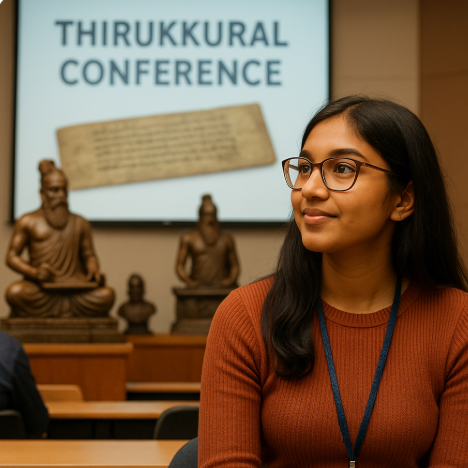3 Facts About the Thirukkural Tamil School Didn't Teach You
- What You Missed In Tamil Class

- Nov 11, 2025
- 2 min read

I recently attended the 6th International Thirukkural Conference at the University of Toronto.
For context:
The Thirukkural is an ancient Tamil work with 1330 poems that are 7 words each. This text has been globally celebrated for decades and been translated into over 40 languages across the globe.
This book is known as a universal guidebook for life. I however, feel this is much more than that. It is a key text for advice on common human struggles but also a window into ancient Tamil life.
I have been studying this text as an adult with others in my Tamil Literature Study Group, and have a much different relationship with it than I did as a kid forced to memorize kurals in Tamil school. So when I heard about this conference from Writer, Thirukkural Translator, and now friend, Thomas Hitoshi Pruksima, I went to see what scholars had to say.
Here's 3 of my biggest takeaways about the world famous ancient Tamil text.
Comparisons:
There were various presentations at the conference comparing the Kural to other works like the Bible, Egyptian works, Sumerian texts etc. exploring the similarities and potential influences. This text has been translated into over 40 languages because of its universal messaging.
So naturally one could ask: Did humans across cultures simples arrive to similar conclusions about life, struggle, love, ethics? Or did this text influence other works worldwide? This question requires years of case by case deep research, and seems the debate is on-going.
Perspectives & Debates:
The Thirukural was orally passed down, recorded on palm leaves, rewritten, then published over thousands of years. We don't know where certain words changed, shifting meanings.
I listened to presentations comparing and debating the potential religious influences of this text. What became clear through group discussion was those who translate or explain these poems inevitably brings their personal experiences and biases.
It is poetry after all.
With universal messaging, it is easy to fit this text into various schools of thought. The consensus amongst scholars remain that this is a non-religious text.
Relevance and Understanding:
There was a lot of discussion about how the younger generation needs to truly understand what this text is.
I don’t think that comes from lectures or forcing memorization.
It comes from genuine curiosity.
At the end of the day, what we need to remember is that this text is over 2000 years old.
I believe an understanding and interest will naturally evolve from self-exploration.
Good or bad, why only base your opinion solely on someone else’s thoughts without exploring it yourself? (Especially when there is a lot of debate and interpretations)
Now this can be quite challenging for those in the Tamil diaspora given it was written so long ago,
which is why I created the Tamil Literature Study Group, a place to question, dissect and discuss ancient texts to better learn about Tamil values, morals, and way of life.
If you want to join me in exploring the Thirukkural (and other ancient works), join the Study Group today











Comments